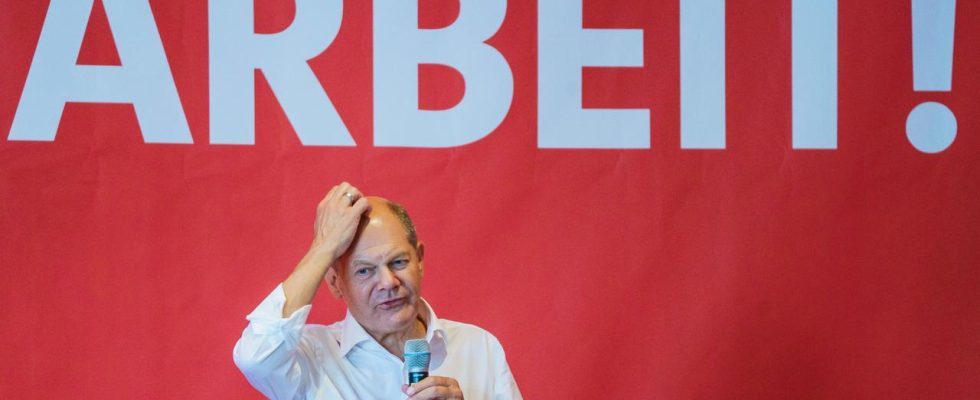analysis
The results in Bavaria and Hesse are also a reckoning with the traffic lights in Berlin. A lot of work awaits Chancellor Scholz. The CDU wins better without Merz. And the AfD is now also strong in the West. Five insights.
1. Not just clean, but Rhine
Boris Rhein has shown that even as a pale Prime Minister with moderate recognition and popularity, you can achieve brilliant electoral success for the CDU. As long as the challengers deliver an even worse performance, make themselves vulnerable by having main jobs in Berlin (Nancy Faeser) or are summarily held liable for everything that the traffic light parties in the federal government fail to do (Tarek Al-Wazir).
Rhein just had to stay clean and avoid his own mistakes. He succeeded. He also stayed away from the party leader and his sometimes ambiguous statements about the AfD or dental treatment for asylum seekers. The CDU wins elections better without Friedrich Merz. This was recently shown by Daniel Günther in Schleswig-Holstein, Hendrik Wüst in North Rhine-Westphalia and now Boris Rhein in Hesse. By the way, they are all around 50 years old and therefore members of the younger guard of the CDU. And by the way, all three have black-green government experience. However, election Sunday brings little insight into the K question in the Union. CSU boss Markus Söder is likely to sell his poor election result in Bavaria as a success and stay in the race for now.
2. The SPD loses three times over
The “social democratic decade” has stalled in Saarland. None of the three traffic light parties is losing as much support as the Chancellor’s party. The fact that there is nothing to be gained for the SPD in Bavaria – for free. But with less than eight percent, the Bavarian Social Democrats are slowly approaching the political death zone.
But the debacle in Hesse is likely to hurt much more. In the former SPD home state, the party once again undercut its own negative record from 2018, is behind the AfD and is also returning from the election campaign with a minister who has suffered massive problems. Nancy Faeser set out to secure power in Hesse for the SPD again after a quarter of a century of opposition. That failed thoroughly. And so the SPD not only lost two elections this Sunday, but also lost a strong minister. Whether and how long Faeser will be able to hold on as Federal Ministry of the Interior or how long the Chancellor will be able to hold on to her is one of the exciting questions of the next few weeks.
But nervousness is also growing in the SPD. Chancellor Scholz’s moderating government style, waiting and letting the yellow-green disputes run their course, is increasingly met with criticism, including within his own ranks. Demands for a clear SPD profile in the traffic lights could be the result. When it came to industrial electricity prices, for example, the parliamentary group opposed the Chancellor’s position. It is unlikely that there will be fewer arguments at traffic lights in the near future. That would probably be exactly what many people want.
3. Oh dear, FDP
Lower Saxony, Schleswig-Holstein, North Rhine-Westphalia, Berlin, Bremen – and now: Bavaria and Hesse: The list of FDP election defeats is getting longer and longer. Only in Saarland was it able to make gains, but it was not enough to enter parliament. Even if the party manages to make it into the state parliament in Hesse with a bang, one thing remains clear: since the Liberals took part in governing the federal government, things have been going downhill. A personnel debate has probably been raging in other parties for a long time, but not in the FDP. Party leader Christian Lindner is – at least officially – not in question. Probably also due to a lack of alternatives.
Instead of shaking up its own top staff, the FDP is working on its traffic light partners. After each election defeat, you could rely on the FDP to tighten its tone – and often enforce its positions. The fact that General Secretary Bijan Djir-Sarai recently branded the Green coalition partner a “security risk for the country” with regard to migration policy gives little hope that the self-proclaimed “progress coalition” will quickly find a common, solution-oriented line on the urgent and emotionally charged issue.
4. The AfD is also strong in the West
In Bavaria and also in Hesse, the AfD is one of the big election winners. The fact that the partly right-wing extremist party was able to make significant gains in both western German states also has to do with the traffic light performance. The AfD succeeds in binding the dissatisfied and turning their discontent into votes. The course of taking a counter-position to other parties on issues such as climate protection or aid for Ukraine continues to pay off.
But to interpret the strong results in both countries as just a protest election would be too short-sighted. More and more people are voting for the AfD out of conviction. The current situation benefits her: Asylum and refugee policy concerns many people, support for a more restrictive migration policy is growing, as can be seen from data from Infratest dimap emerges. At the same time, fewer and fewer voters in both countries have a problem with voting for a party that is partly right-wing extremist. And it is not just in migration policy that it is increasingly being given authority: more people are also placing their hope in the far-right party when it comes to the issues of internal security, the economy and social justice.
5. Green borders
The Greens have suffered a setback. They lose significantly in both Bavaria and Hesse – in both states they achieved record results in the previous state elections. Like the SPD and FDP, the Greens suffer from widespread dissatisfaction with the traffic light coalition. However, this alone cannot explain the result: voters are also turning away from the party in terms of content. The green liberal position is losing support in migration policy. Many people are also very worried about economic development and this reduces their willingness to take (expensive) climate protection measures. The so-called heating law is just one example. Even pragmatic real politicians like the Hessian top candidate Al-Wazir are unable to achieve success under these conditions.
The Greens are heading towards a dilemma, and not just in the traffic light coalition. If they insist on their principles, they will be punished as a “banned party” that has concerns about preventing economic recovery. If they make too many compromises, they betray their ideals and thus alienate their core clientele.
outlook
In addition to the European elections in June, there are three state elections in East Germany next year. Comparatively easy government formation, as is currently the case in Bavaria and Hesse, is not expected in Thuringia, Saxony-Anhalt and Brandenburg in September. If the AfD performs as strongly there as it currently does in the surveys, creative solutions are likely to be required and/or firewalls will shake a lot.


